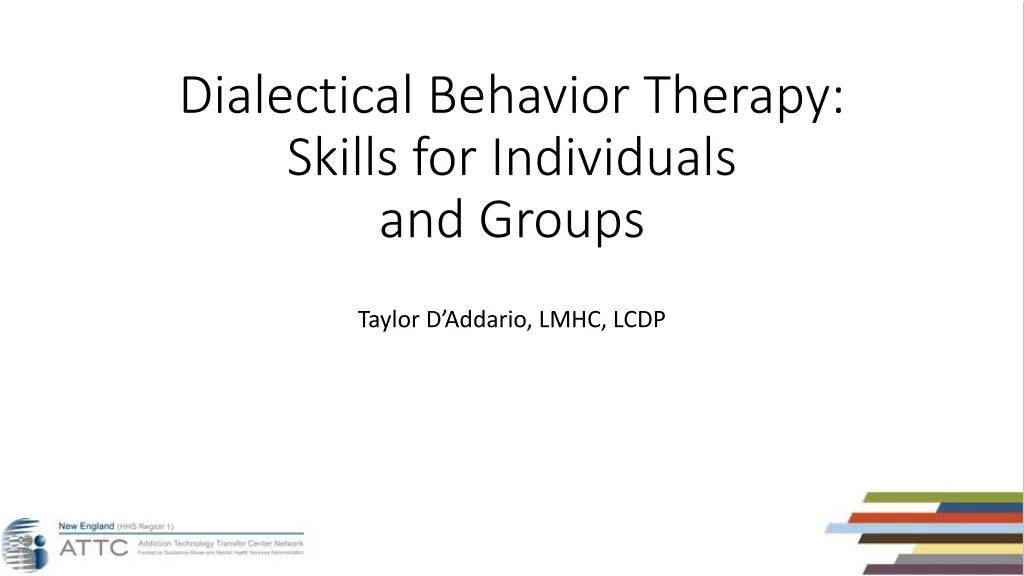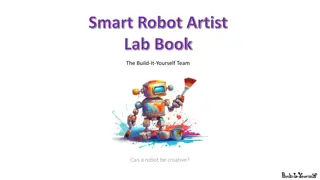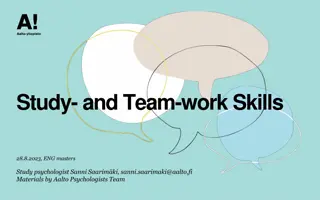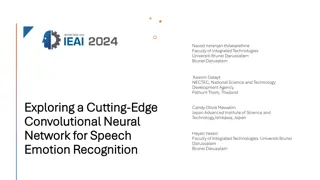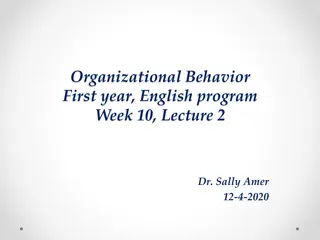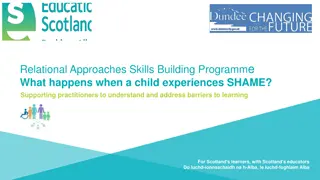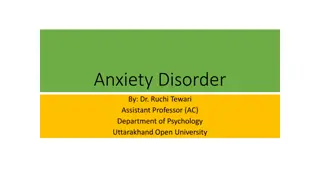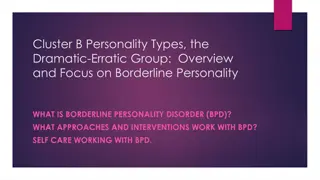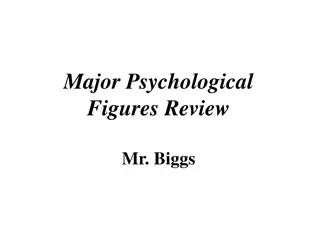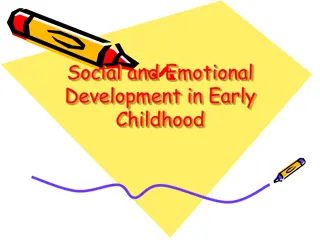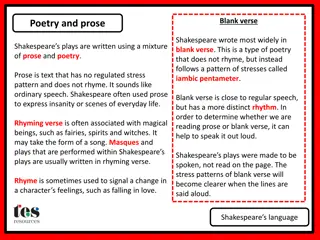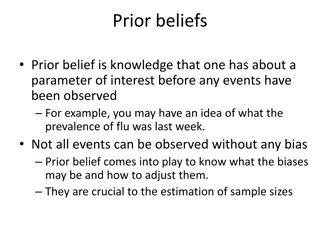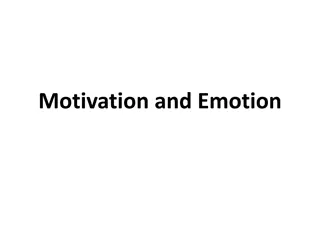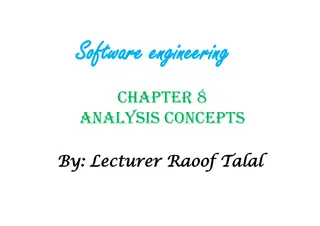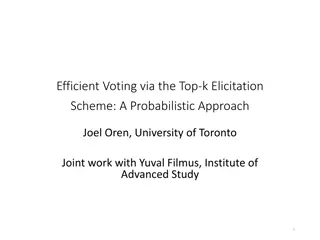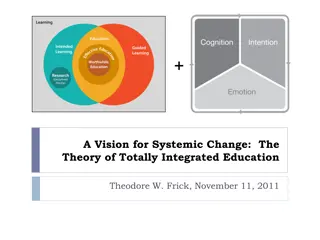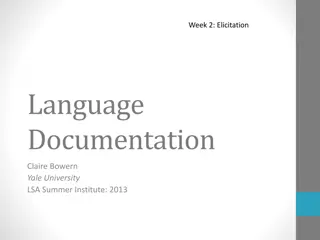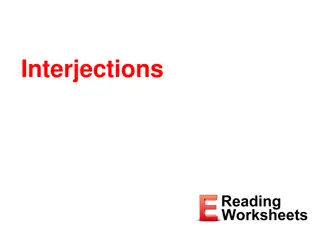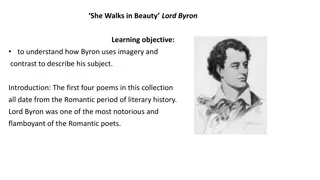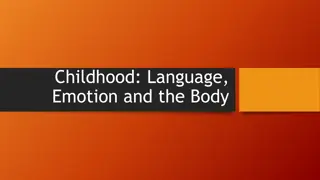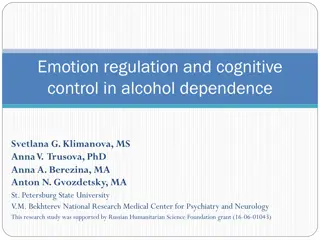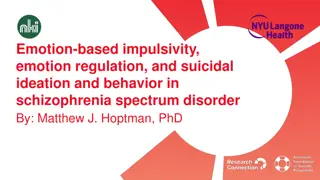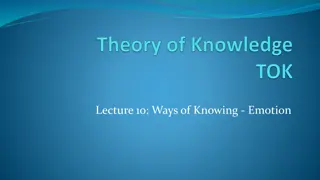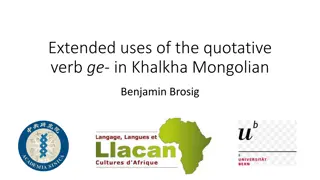Elicitation techniques
An outline of the requirements engineer's non-technical skills, including analytic thinking, empathy, communication skills, conflict resolution skills, and moderation skills.
1 views • 35 slides
Exploring micro:bit - The Next Gen Technocamps Partnership
Discover the collaboration between Technocamps and the micro:bit Foundation in Wales, bringing the new phase of micro:bit projects to students. Dive into what micro:bit can do, explore coding with Makecode, engage in fun activities like Emotion Badge coding, and learn how to use button events to con
0 views • 30 slides
Understanding Dialectical Behavior Therapy (DBT) Skills and Practices
Explore the foundations of Dialectical Behavior Therapy (DBT) as a treatment for various dysregulation behaviors. Learn about the history, skills, and outcomes associated with DBT, including mindfulness practices and emotional regulation techniques. Discover how DBT combines cognitive behavioral the
5 views • 96 slides
Requirements Elicitation in Software Engineering
Understanding and gathering software requirements is a critical step in the software development process. This involves identifying, analyzing, documenting, and validating the needs and constraints of the project stakeholders. Effective requirements elicitation ensures that the final product meets t
0 views • 23 slides
Exploring Creativity in Robotics: Can a Robot Be an Artist?
Delve into the world of robotics and creativity as we ponder the question: can a robot truly exhibit creativity? Join us on a journey to teach a robot to draw creatively, exploring the intersection of technology and artistry. Discover research principles of famous art designs and innovative projects
2 views • 15 slides
Enhancing Learning Skills and Success Strategies
Explore the factors crucial for successful learning, such as prior knowledge, motivation, emotion regulation, and time management. Delve into different approaches to learning, including deep, surface, and systematic approaches. Discover effective study techniques, including self-testing, distributed
2 views • 24 slides
Understanding the Cognitive Approach to Behavior
Cognitive processing involves the various mental activities such as thinking, remembering, believing, and decision-making that influence our behavior. This approach examines how these processes are organized through memory, schemas, and thought, and how they are influenced by culture, gender, and em
5 views • 26 slides
Self-Care Strategies for Graduate Students
Discover essential self-care strategies for graduate students to effectively manage stress. Learn about the causes and signs of stress, explore coping mechanisms such as problem-focused and emotion-focused strategies, and find practical stress management techniques like yoga, self-massage, progressi
3 views • 12 slides
Understanding Anxiety: Causes, Effects, and Solutions
Anxiety is a natural emotion that can lead to physical symptoms and disruptions in daily life. Causes include stressful events, high-stress environments, personality traits, and childhood trauma. Effects may manifest as sweating, fatigue, sleep disturbances, and excessive worry. Solutions involve re
2 views • 11 slides
Exploring a Cutting-Edge Convolutional Neural Network for Speech Emotion Recognition
Human speech is a rich source of emotional indicators, making Speech Emotion Recognition (SER) vital for intelligent systems to understand emotions. SER involves extracting emotional states from speech and categorizing them. This process includes feature extraction and classification, utilizing tech
1 views • 15 slides
Understanding Emotional Labor in Organizational Behavior
Emotional labor involves employees expressing organizationally desired emotions during work interactions, impacting job performance. Employees may face emotional dissonance when projecting one emotion while feeling another, leading to surface or deep acting. Affective Events Theory (AET) suggests th
0 views • 19 slides
Understanding the Impact of Shame on Children: A Skills Building Programme
Shame is a powerful and universal emotion that can have detrimental effects on children's behavior and emotional well-being. This programme aims to support practitioners in recognizing and addressing shame to help create a more positive learning environment for Scotland's learners. Through understan
2 views • 17 slides
Understanding Anxiety Disorders: Causes, Symptoms, and Types
Anxiety disorders are a group of mental illnesses characterized by excessive and overwhelming anxiety and fear. This article explains the normal emotion of anxiety, symptoms of anxiety disorders, types of anxiety disorders, and common causes like genetics, brain chemistry, environmental stress, and
1 views • 8 slides
Understanding Borderline Personality Disorder (BPD) and Cluster B Personality Types
Borderline Personality Disorder (BPD) is part of the Cluster B Personality Types characterized by emotional instability, impulsivity, and strained relationships. Approaches for BPD include dialectical behavior therapy (DBT) and cognitive-behavioral therapy (CBT), while interventions involve emotion
1 views • 24 slides
Major Psychological Figures Review
Explore the significant contributions of major psychological figures such as Adler, Asch, Atkinson, Bandura, Beck, Binet, Cannon, and Chomsky. Delve into their theories on individual psychology, social conformity, memory storage, observational learning, cognitive therapy, intelligence, emotion, and
0 views • 57 slides
Early Childhood Social and Emotional Development Insights
Social and emotional development in early childhood is influenced by various factors such as family dynamics, parenting styles, peer interactions, and cultural backgrounds. Erikson's stages highlight the importance of initiatives and self-understanding in shaping emotional growth. Parents play a cru
2 views • 35 slides
Understanding Shakespeare's Versification: Blank Verse, Iambic Pentameter, and Sonnets
Shakespeare's writing encompassed various forms of poetry and prose, notably blank verse, iambic pentameter, and sonnets. His works showcase a mastery of language and rhythm, with blank verse representing unrhymed poetry following iambic pentameter patterns, while sonnets adhere to strict rhyme sche
0 views • 6 slides
The Romantic Period in English Literature: Embracing Emotion and Individualism
The Romantic period (1798-1837) in English literature was marked by a shift towards valuing emotion, individualism, and nature over rationalism and industrialization. Influenced by societal changes, the movement included prominent poets like William Wordsworth, Samuel Taylor Coleridge, and Robert Bu
0 views • 33 slides
Understanding Rhetoric: Ethos, Logos, Pathos in Persuasion
Rhetoric explores the art of persuasive communication, emphasizing three key components: Ethos (credibility), Logos (logic/facts), and Pathos (emotion). Understanding the three types of rhetoric and persuasive appeals can enhance one's ability to craft compelling arguments. Through examples, student
0 views • 10 slides
Understanding Prior Beliefs and Eliciting Expert Opinions in Parameter Estimation
Prior beliefs play a crucial role in estimating parameters of interest before observing events. They can be elicited from sources like meta-analyses, literature, and expert opinions. Experts' beliefs are often measured using Beta or Normal distributions for different outcomes. Eliciting prior belief
0 views • 22 slides
Understanding Motivation and Emotion: Key Concepts and Types Explained
Motivation, derived from Latin "movere" meaning to move, is a force that drives behavior towards goals. It encompasses intrinsic and extrinsic motivation, different types of motives such as primary, stimulus, and secondary motives, and the interplay of needs and desires that influence human behavior
3 views • 27 slides
Understanding Requirements Analysis in Software Engineering
Requirements analysis is a crucial task in software engineering that bridges the gap between system engineering and software design. It involves specifying software's operational characteristics, interface with other system elements, and constraints it must meet. Through elicitation processes like m
9 views • 30 slides
Efficient Voting via Top-k Elicitation Scheme: A Probabilistic Approach
This work presents a probabilistic approach for efficient voting through the top-k elicitation scheme, focusing on communication-efficient group decision-making. The goal is to select the best outcome while minimizing the extraction of excessive information from committee members. The study explores
0 views • 18 slides
VN Photography Capturing Life's Precious Moments with Style and Emotion
VN Photography \u2013 Where Style Meets Emotion in Every Frame\nAt VN Photography, we turn life's moments into visual masterpieces. Led by Vedish Naidu, we specialize in capturing fashion shoots, weddings, and special events with a perfect blend of c
0 views • 1 slides
Understanding the Impact of Gambling: Concepts, Controversies, and Next Steps
Dr. Matthew Browne's presentation in Istanbul in December 2019 discussed the theoretical framework, burden of harm projects in Australia and New Zealand, current work, and conclusions related to the adverse consequences of gambling on health and well-being. Focus areas included harm distribution, ta
0 views • 18 slides
Enhancing Education Through Totally Integrated Approach
Theodore W. Frick's Theory of Totally Integrated Education (TIE) emphasizes aligning student cognition, intention, and emotion with authentic learning tasks to create worthwhile education. TIE focuses on systemic change in education and provides a vision for improving learning outcomes by connecting
0 views • 55 slides
Structured Elicitation Methods for Language Documentation
Explore various types of elicitation methods such as structured translation, grammaticality judgments, and picture identification tasks for language documentation. Learn how to design tests, conduct sessions, and analyze language outcomes effectively. Understand the importance of using appropriate v
0 views • 22 slides
Understanding Pathos in Argumentation: An Ethical Perspective
Pathos, as highlighted by Aristotle, plays a crucial role in argumentation by appealing to the emotions of the audience. While traditional views might view emotion as secondary to reason, a deeper insight reveals that emotion-based elements are essential for crafting powerful and ethically sound arg
0 views • 30 slides
Understanding Immunotoxicity in Fish: An Alternative Model for Toxicological Studies
The study explores the immunotoxic effects of industrial effluents on fin fish, highlighting xenobiotics' impact on the immune system. It discusses the sensitivity of the immune system to environmental toxins and the elicitation of immune reactions by various substances. The importance of fish as a
0 views • 25 slides
Expert Judgment Elicitation Process in Risk Management
Explore the expert judgment elicitation process for risk management, focusing on modeling inputs as triangular distributions, overcoming bias, and justifying expert opinions. Learn to convert distributions, engage in Q&A sessions, and incorporate visual aids effectively.
0 views • 34 slides
Understanding Interjections: Words of Emotion and Excitement
Exploring the world of interjections, words that express excitement or emotion in speech. Learn how to use interjections appropriately in dialogue and understand that they are not suited for formal writing. Examples and insights provided throughout the content showcase the role of interjections in l
0 views • 9 slides
Understanding Lord Byron's Use of Imagery in "She Walks in Beauty
Lord Byron, a prominent Romantic poet, utilized vivid imagery and contrast in his poem "She Walks in Beauty" to describe his subject. His life and poetic intentions reflect the Romantic ideals of emotion over reason. The poem, part of the collection "Hebrew Melodies," was meant for musical adaptatio
0 views • 7 slides
Unveiling the Essence of Poetry: Music, Emotion, and Magic
Delve into the vibrant world of poetry through the lens of music, emotion, and magic. Explore the lively language of poetry that captures the essence of human experiences and evokes powerful emotions. Unlock the secrets of crafting poems that resonate deeply with readers by harnessing the magic of p
0 views • 22 slides
Insights into Childhood: Language, Emotion, and Society
Explore the intricacies of childhood through the lens of language, emotion, and societal constructs. Delve into the evolution of childhood perceptions, from Philippe Ariès' historical analysis to Willem Koops' examination of children as products of societal imagination. Discover how cultural norms
0 views • 25 slides
Exploring Wise Mind: Where Reason and Emotion Converge
Delve into the concept of Wise Mind, where reason and emotion intersect, through a series of insightful reflections on mindfulness, decision-making processes, and the three states of mind. Engage in meaningful conversations with classmates to deepen your understanding and practice applying these pri
0 views • 9 slides
Requirements Elicitation Techniques Overview
This content provides an overview of requirements elicitation techniques, including analysis of existing systems, documentation, observation, and various methods like interviews, questionnaires, brainstorming, and prototyping. It highlights the importance of effective communication and understanding
0 views • 114 slides
Emotion Regulation and Cognitive Control in Alcohol Dependence Study
This research study focuses on emotion regulation and cognitive control in alcohol dependence among patients in Russia, exploring treatment characteristics and barriers. The goal is to understand how these factors influence sobriety maintenance post-detoxification to develop effective psychotherapeu
0 views • 13 slides
Impulsivity and Suicidal Ideation in Schizophrenia Spectrum Disorder
This study by Matthew J. Hoptman, PhD, explores the relationship between emotion-based impulsivity, emotion regulation, and suicidal ideation and behavior in schizophrenia spectrum disorder. It examines the dimensions of impulsivity, including urgency, in individuals with schizophrenia compared to h
0 views • 22 slides
Exploring Emotion as a Way of Knowing and Emotional Intelligence
Delve into the concept of emotion as a Way of Knowing (WOK) and the significance of emotional intelligence in acquiring knowledge about our own and others' emotions. Understand the distinction between emotional intelligence and traditional WOKs, and challenge stereotypes regarding emotion's impact o
0 views • 15 slides
Exploring Extended Uses of the Quotative Verb "ge" in Khalkha Mongolian
This research delves into the extended uses of the quotative verb "ge" in Khalkha Mongolian through evidence from corpora, sentence data, and elicitation methods. It highlights various types of functions such as minimal extensions, topicalization, clause connection, additive focus with "gese," inten
0 views • 37 slides


